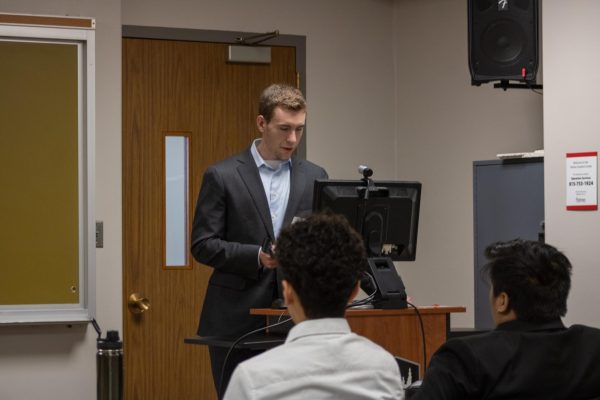Professors get ready to do research in Antarctica
March 29, 2005
NIU professors will study global warming in Antarctica next winter after receiving a $2-million grant.
The university will purchase a sub-ice remote ocean vehicle, which is unmanned and shaped like a mini-submarine.
It will be 6 feet long and 18 inches in diameter and painted yellow.
The ROV will include five cameras and 16 other instruments used to test the temperature and salinity of water. It will also gather seafloor and water samples.
“It is similar to what was used to explore inside the Titanic,” said Ross Powell, a geology and environmental geosciences professor. “We hope to have a live video feed from ROV so classes can be involved with this as well.”
Deep Ocean Engineering and Research Marine is building the ROVfor $700,000.
Money for the project was given to the university through a grant from the National Oceanic and Atmospheric Administration.
“No university or state money is being used to fund this,” said Johnathan Berg, department of geology and environmental geosciences chair. “For all of the equipment, the drill, the ROV and the instruments, it will cost about $2 million.”
To get the grant, Powell wrote a proposal explaining the need for the equipment. From there, the proposal was put up for review in front of other scientists, and the money was given to NIU late last year. Powell said the funding process began last year around this time.
The Board of Trustees approved allocation of the funding at its meeting Thursday.
Powell, along with NIU professors Reed Scherer, Melissa Lenczewski and Stefan Vogel, a postdoctoral, will make the trip. They conduct research in Antarctica on a large chunk of ice that has broken off the main section of ice. The research will study global warming effect’s and how fast the underlying ocean water dissolves the chunk of ice.
“We think it’s [very] important,” Powell said. “The ice we will be on is the size of Texas.”
Because of logistical problems in getting the equipment in time to be shipped to Antarctica, Powell said he was not sure exactly when they will start working on the project itself.
Before the research can begin, a hot water drill will be used to cut through nearly two miles of ice. From there, the ROV will be lowered down into the hole and will expand once it reaches the bottom.
“Drilling the ice takes about 24 hours,” Powell said. “But we will be out there living in huts for about two months.”
It will take three trips to complete the research.
After each trip, the equipment will be taken apart, examined and possibly repaired, Powell said.
Extreme temperatures force the researchers to conduct the research during Antarctica’s summer, which is in December and January.
While three representatives from NIU will be working on the project, professors from Penn State, New York University and the University of California will also be there.
“We were going to have international collaboration from some New Zealanders if we went this year, but now we don’t know,” Powell said.












